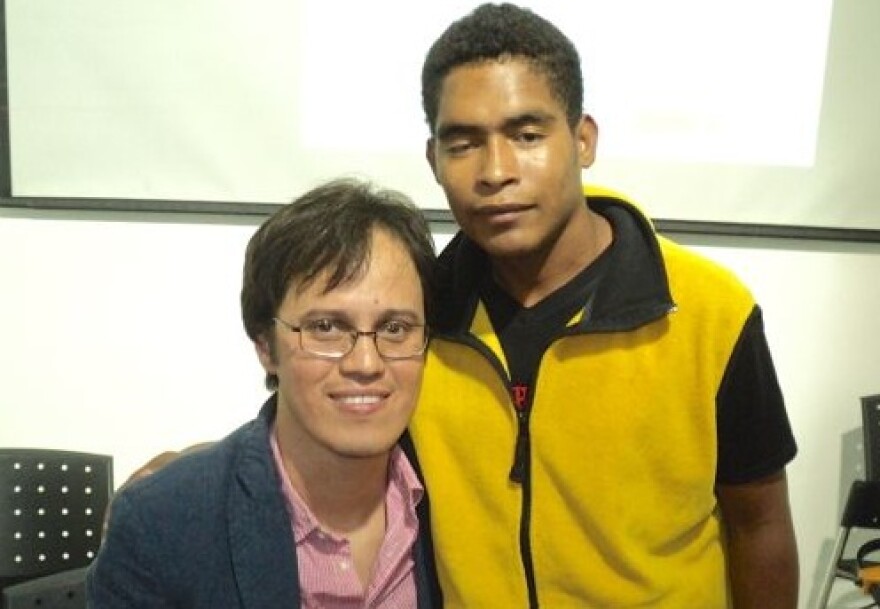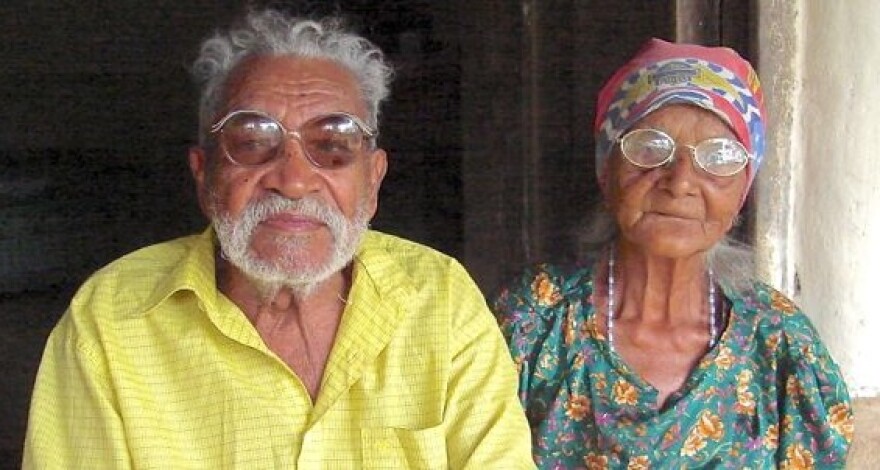Christmas had us coming and going. And not just here in Honduras.
A week before Christmas, my sister Barb arrived at her St. Louis city home about 5 p.m., threw a big bag of Christmas presents and her even bigger purse on the couch, coaxed Jah the dog, blind and frail, out the door, and went for a walk. She returned to find her house lit up like a torch, in flames and smoke.
Too shaken even to dial 911, she screamed it aloud, but the neighbors assured her they had already called. By the time a swarm of fire trucks arrived, it was already too late, so fast and furious was the blaze. In fact, things like her TV, computers, furniture, clothes didn’t just burn, they MELTED. A space heater with a thermostat might have been the culprit, but the house is old.
About midnight, she texted me with the horrifying news, then added: “Well, I’ve been praying recently to find some way to simplify my life. Do you think God maybe misunderstood?” Even in a tragedy, she’s still Barb!
I wanted to drop everything and go up to St. Louis, but Barb, longing for the time to sort things out, urged me to stay put, and just pray. At least one prayer had already been answered. Can you imagine if the fire had struck at night while Barb was asleep upstairs, or if she might have tried to put it out herself?
George, her favorite handyman, helped her pick through the rubble. Priceless photo albums were among the finds. And when her melted purse seemed a total loss, Barb’s friend Maria said, “Let’s cut it open.” Inside, like pearls in an oyster, were her wallet, credit cards, ID, license, etc., all perfectly intact.
The saddest picture from the fire was the front door, ruined and gaping, its antique leaded glass exploded, the door that welcomed everyone and anyone, the door we joked about forever because the key or keys almost never worked, if you could even find them hidden on the porch, now a door to nowhere.
Birthday and graduation
Meanwhile, here in Las Vegas, little Mariana Teresa, named by mom and dad Maricela and Juan Blas for our sister Mary Anne, who died in 2009, celebrated her fourth birthday. Can we take that as a “sign”? More life! even if Carlota accidentally shortened her name to “Maria Teresa” on the cake.

Actually, her nickname is even shorter, Marite.
Her big sister Milena had a celebration, too, graduating in Arts & Letters from a college in El Progreso. Maricela and Juan Blas invited Chemo and me to the event, which I took as a “sign” to enhance the celebration.
I love to see education given such a priority against all odds. The church gave Milena, who wants to be a doctor, a scholarship. So, bus fare and such, and a big lunch with her brother Manuel and family, who live in Progreso, at the “world famous” Las Tejas restaurant (“Your Place for Meat”) were the least I could do!

Graduations in Honduras are even more solemn than in the States, so I almost fell off my chair when “El Progreso’s Own” Victoria took the stage with a mini-concert of about 4 or 5 songs before they handed out the diplomas. It was as if Tina Turner showed up! “I never graduated from anything, but you kids are GREAT!” Most of the faculty sort of fidgeted, but when she got the music teacher up there with her for some wild moves, they brought down the house. I made a point of seeking out the Master of Ceremonies afterward to thank him for inviting her. He blushed.
We took advantage of the trip to El Progreso to see Teatro La Fragua’s signature production “Navidad Nuestra,” the Christmas story with a Honduran twist. They’ve been doing it for 30 years, but it’s as fresh, revolutionary, really, as Pope Francis’ latest call for the “Christian” church (you notice he doesn’t just say “Catholic” church) to return to its roots in poverty and service.

Jack Warner, a Jesuit priest who started the Teatro, watches every performance as if it were the first; he must feel amazed to have at last a Pope who “gets it.” Maybe, just maybe, they can perform it for Francis when he visits Central America.
We got another invitation, this one from Carlos Ordonez, a young poet whose work I discovered in 2004 when he was just 20. His email address was inside and so I contacted him to congratulate him and invite him to Las Vegas. I never imagined he would accept, bringing two other poets with him. We had a “Noche Cultural” that included local poets of our own, especially Erlinda, and a tribute from Beto, who memorized one of Carlos’ poems that I taught him, since Beto is blind. Carlos was moved to tears. In fact, the theme of Carlos’ poetry, like his mentor Roberto Sosa is, you might say, the tears of the poor, as the title of his first book “Llanto Alrededor” (‘Grief Abiding’) suggests.
The new book would be launched in another “noche cultural” at the Cultural “Annex” of the Spanish embassy, no less, in Tegucigalpa. Carlos now makes films with his wife Ursula in Brazil, so this would be our only chance to see him till who knows when.

The new book has the challenging title, “Disturbio,” prose-poems of pure imagery, words in a million colors. I suppose he is on the verge of international fame, but he greeted me and Chemo like family, and warmly introduced us to his mother and father as well as Ursula’s parents: “These are the friends I keep telling you about.”
Chemo has watched Carlos’ documentary film about Brazil’s oldest poet, hardly an “action movie!” over and over. And Carlos also inscribed a copy of “Disturbio” to Angelica, who met him when he would pick us up for lunch at the Nanking Hotel, where she has her little candy stand out front.
The “Disturbance” of the title is our struggle to be ourselves, a meaningless pursuit without solidarity with the dispossessed.
Carlos’ vision comes from his tiny village Orocuina, folks like our own Celestino, who died a week before Christmas at the age of 99 (some say 100, some even more) in Paraiso, the “town between two rivers” that he founded with his wife Liandra next to Las Vegas. When I heard the news, I knew I had a great picture of him, but when I went searching for it, I was pleased to find it was one of the first pictures I took when I moved down here in 2003.
Here, Christmas Eve IS Christmas. That’s the tamales, that’s the visits, that’s the only Mass. So when I asked Godo, “Are we doing anything tomorrow?” he drew a blank. Then we remembered it was the finale of Celestino’s novenario. Perfect! Our Christ child would be a centenarian!

The celebration, some singing, some preaching, everyone a coffee and rolls, it was Paraiso’s Secret Santa. Martin, one of the grandchildren, said at one point, “I’ve been doing some figuring.” In his lifetime, Celestino and Liandra had 8 children (3 boys, 5 girls), 71 grandchildren, 241 great-grandchildren, 109 great-great-grandchildren, the latest Luis Fernando, born November 9. Abraham and Sarah, call your office! But even with this cloud of witnesses, Liandra grasped my hand as I was leaving. “Don’t stay away, I’m all alone now.”
May I say the same, to you. Stay close, in the New Year. Keep my sister even closer. Fires certainly do “simplify” things. At midnight January 1, we burned up 2013 in the form of an old dummy “ (‘Pichingo’) stuffed with firecrackers, at the soccer field. Bless you for giving us hope that 2014 will stay fresh all year!

Miguel Dulick has lived in Las Vegas, Honduras, since 2003. There he has no projects, no plans, no investments -- only to share the life of the poor. For years he has been sending reports back to friends and family in his native St. Louis. In sharing these reports, we offer a glimpse of how life is so different, yet so much the same, in different places. More are available on stlbeacon.org.

